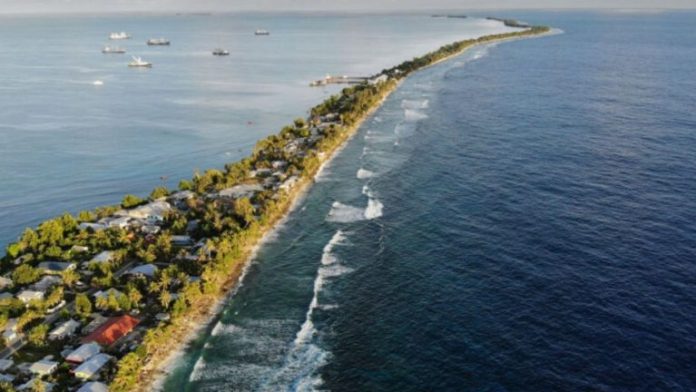Experts from the Australian National University (ANU) warn Pacific nations are at risk of being left behind in global climate negotiations if they aren’t a focus of the upcoming COP26 summit.
The United Nations COP26 UN Climate Change Conference takes place in Glasgow from 31 October to 12 November.
Dr Siobhan McDonnell, Dr Ian Fry and Sala Dr George Carter will attend the crucial climate talks. They will argue Pacific Island nations must have a strong voice during the conference after previously having had their desire for a carbon market blocked by bigger countries.
Dr Virginia Marshall will also attend as a delegate of the Indigenous Peoples’ Organisation Australia and the UN Local Communities and Indigenous Peoples’ Platform.
Dr McDonnell, a senior lecturer at the ANU Crawford School of Public Policy, said all governments must work harder to ensure the urgency of the climate situation facing all Pacific Island nations is heard at COP26. She also negotiated for Vanuatu on loss and damage at COP25, and will be supporting the Fiji delegation on loss and damage this year.
“There’s an urgency around Pacific island countries; this is not just an issue of adaptation. There are issues of material and non-material loss and damage caused by the impact of climate change that are tangible and real,” Dr McDonnell said.
“These are actual costs that are borne now and into the future by Pacific island nations and their people in terms of spiritual loss of place, loss of aspects of culture, burial grounds and loss of attachment to place.”
Senior lecturer at the ANU Fenner School of Environment and Society Dr Ian Fry has been attending the COP conferences since 1997 when the Kyoto Protocol was completed.
Dr Fry said his focus is on finalising the rules for carbon markets for least developed countries (LDCs) under Article 6 of the Paris Agreement.
“At the last COP in Madrid, we got very close to a final decision that would implement the carbon market, but Brazil blocked an outcome. Since then, we have been having many online informal negotiating sessions to resolve some of the outstanding issues,” he said.
“The key issue for LDCs is to ensure that the carbon market delivers real emissions reductions and not just a means whereby some countries can buy their way out of not meeting their emissions reduction goals through the market.”
Director of the ANU Pacific Institute and Research Fellow at the ANU Department of Pacific Affairs, Dr George Carter said the urgency of negotiations for Pacific island nations at COP26 is nothing new, given that representatives have been lobbying for climate action since 1990.
“It is their greatest contribution and legacy in international politics,” Dr Carter said.
“The signs are detrimental and there is an existential threat to the livelihoods, the security and the well-being of Pacific people. The future is far less viable for many Pacific islands, especially people in low coral atoll nations.
“Pacific Small Island Developing States and like-minded, multi-actor coalitions are at the forefront of making sure the current negotiations for the Paris Agreement uphold environmental integrity.
“All these parties have high ambition on mitigation, finance, adaptation, loss, damage and oceans.”
Dr Marshall said her role at COP26 will help build cross-Pacific Indigenous collaboration and her ongoing engagement with 14 Latin America ambassadors, facilitated through the ANU National Centre for Latin American Studies.
She said addressing climate change must be part of the Federal Government’s revised National Roadmap for Indigenous Australia.
“Climate change will have major impacts on biodiversity, water security and fire regimes across Australia’s vast expanse of Indigenous estate,” Dr Marshall said.
SOURCE: ANU/PACNEWS













